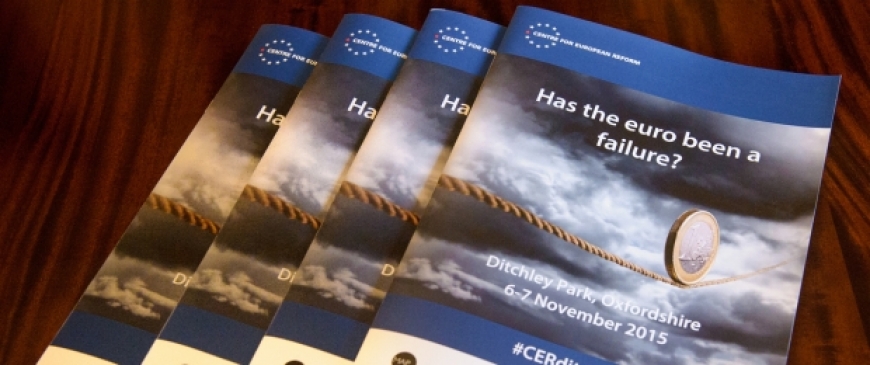
The European unicycle
I attended the annual Centre for European Reform conference at Ditchley Park earlier this month, with the topic 'Has the euro been a failure?'. The conference was attended by a fairly impressive list of British and continental European economists and policymakers. It was held under the Chatham House rule (so no views can be attributed – and nothing in this blog could or should be taken as reflecting any individual’s views except my own). But I thought it was worth recording my own brief, and subjective, summary of the various conversations (CER will in due course produce a fuller, more detailed record).
In particular, I identified six key points:
- Perhaps unsurprisingly, no-one claimed that the euro had been a success. Equally unsurprisingly, there were divisions between those who said that the failure so far was inevitable, the result of inherent structural flaws, and those who blame bad policy-making and failure to respond properly to the financial crisis. Of course, which side you are on is partly an (unanswerable) political economy question – with better design and political leadership, would better policies have been feasible?
- More interestingly, there was (in sharp contrast to the event two years earlier, where there was bitter disagreement about the appropriate stance of macroeconomic policy) there was (I thought) a generally shared view that both monetary and fiscal policy had overall been too tight and that while they had been loosened, they needed to be loosened further if the eurozone is to see a sustained and broad-based recovery.
- There was (and this was perhaps the most surprising thing to me) a clear view that “muddling through” (and/or “kicking the can”), which of course has been very much the strategy adopted by eurozone leaders to date, was at best extremely risky, and at worst almost doomed to failure. Many said that the eurozone would not survive another significant economic downturn, whether internally or externally generated, and/or a political crisis in a large member state.
- This in turn led to a consensus that the eurozone needs major structural change, perhaps to survive, but certainly to thrive. This meant some combination of banking and capital markets union, fiscal risk-sharing, and putting the ECB’s lender of last resort function on a proper basis; accompanied by the necessary degree of political agreement. There was plenty of debate about the details, but little about the direction of travel.
- By contrast, there was an equally strong shared view that these necessary changes were simply not politically realistic in the near term. Several participants spoke about a “grand bargain”, encompassing both political and economic changes and perhaps other issues – most pressingly, of course, coordinated action to help deal with the refugee crisis – but almost nobody thought this was remotely plausible.
- But if mending the euro was not a viable option, equally, there was an almost universal view that ending it wasn’t either – that is, that an orderly dismantlement of the euro and a return to national currencies for at least some currencies simply wasn’t practicable. The likely consequences would be some combination of severe financial dislocation (in the short run) and continuing and damaging economic and political uncertainty over how European countries would manage their exchange rates (in the medium run).
This led me to observe that we seemed to be replacing that the “bicycle theory” of European integration (you have to keep pedalling or you fall off ) with a “unicycle theory” – you can go backwards and forwards for a bit, but not very far, and it’s all too easy to go round in circles and then fall off.
I was left with the rather depressing conclusion that the European policymaking elite knows (or thinks it does) what needs to be done, but knows it doesn’t know how to do it. And knows that further crisis is likely, but knows it doesn’t know how to avert it.
Finally, it is also worth noting that there was absolutely nothing on the agenda that related in any way to the refugee crisis; but that didn’t mean it wasn’t raised a number of times. In particular, there was considerable sympathy for the lack of solidarity shown by some other countries for those that are bearing the main burden (Germany and Sweden) but again, a recognition that the political space to change this simply doesn’t exist. Especially in France. And the events of Friday won’t help.
How does this all relate to the EU referendum? First, I noted that even among extremely well-informed non-UK observers, there’s a remarkable degree of incomprehension about what it is precisely we’re worried about, what we want, and what we hope to achieve. In particular, the obsession of the UK media with EU migration – not top of the agenda anywhere else in the EU at the moment – isn’t really understood at all. Still less why the peculiarities (as they see it) of the UK benefit system should be a problem for the EU as a whole (more on this from me here).
But more broadly, the conference confirmed again my personal view – that whatever your position, this is precisely the wrong time for the UK to be having a referendum on EU membership. Over the next few years, the EU, and in particular the relationship between the eurozone and other Member States, will change profoundly. When we know what that might look like, that would be the right time for a referendum. At the moment, we simply don’t know what sort of European Union we’re choosing to remain or leave. And so we are arguing about third order issues like migrant benefits. That is not a sensible way to determine the UK’s economic and political destiny.
It was an enjoyable and stimulating weekend, but I didn’t return to London in a particularly cheerful mood.
Jonathan Portes, Principal Research Fellow, National Institute for Economic and Social Research
